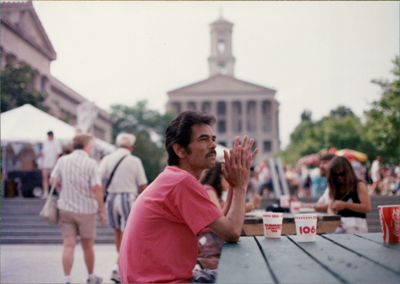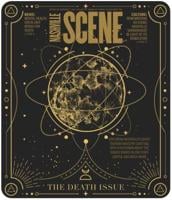
When Hajime Keruma opened the shoebox-sized Koto Sushi Bar in 1985, it didn’t look like much more than an odd footing at the base of the Shelby Avenue bridge.
That was back when you could still drive across the bridge from East Nashville and find an easy place to park on Second Avenue. Lower Broadway was still a neon-stained collection of strip joints and un-ironic honkeytonks and traffic wasn’t much of an issue.
The only other lights south on Fourth Avenue near Koto came from the neon palm tree of The Jungle, a gay bar too seedy even for Lower Broad.
If you were hip to sushi, though, Koto was a beacon as the first and only sushi game in town. Elevated behind the refrigerated counter that filled most of the space, Haji would greet guests while his wife Song-mi collected drink orders and moved like a ballerina through the crowded space.
Sadly, Keruma passed away last week at the age of 64 after a private fight with lung cancer.
Koto Sushi Bar was a strange sight in Nashville at the time, when Japanese cooking meant shrimp-flipping jokesters slinging knives and teriyaki sauce in front of hibachi grills. It was homey in a divey, claustrophobic way, because it always had an air of genuine hospitality, and the food was good.
Haji, as customers came to know him, would look up when you came in and immediately greet you. He was slender and refined, molding rice with deft fingers and gliding his knife through the seaweed wraps, methodically lining up roll sections on a plate.
What was called ethnic dining in Nashville at the time was still mostly sanitized versions of global cuisines. Tacos were hard corn saddles laden with lettuce and cheese, and Chinese food was stripped of most of its identity and punch. And that was pretty much the extent of it except for a few odd outliers like kitschy Polynesian places.
But sushi was more exotic still. It was the brunt of jokes about eating bait. Raw fish was not part of the Southern culinary vernacular. What made the place, though, was Haji Keruma’s energy and wit, and the understanding that conversation not only made people at home, it made friendships. And he could seemingly talk about anything.
The community that gathered to remember him included songwriter Norro Wilson — who co-wrote Charlie Rich’s “The Most Beautiful Girl” — and music attorney Wayne Halper. Both ended up on the menu with namesake sushi rolls, at the time a quirky badge of honor. Halper discovered Koto when it first opened, joining other music industry folks like James Stroud and Scott Borchetta at the small venue, along with lawyers, Vandy professors and other professionals who were more excited than intimidated when Nashville finally got its first sushi restaurant.
“It’s the passing of the guard,” says Halper, who spoke at Keruma’s service on Saturday. “Our families grew up together, it was 30 years of our life,” he continues, adding with pride, “I was the first roll he named.”
Keruma was a native of Okinawa, Japan, who moved to Clarksville in 1978. After a stint as a barge chef, something he liked to laugh about, he opened Koto as the first sushi restaurant in town. Growth and change downtown pushed Koto to Seventh Avenue North and then later to 421 Union St., where it is now. According to Keruma’s son James, Koto Sushi Bar will continue to operate under the guidance of his mother. A friend of Hajime Keruma is filling in as sushi chef until they hire someone new.
We celebrate long-tenured restaurants in the new age of rapid expansion, but sometimes we forget the true quiet pioneers. Beyond Hajime Keruma’s authenticity as a sushi chef, he loved hospitality in the deeply genuine way that can never be taught. His spirit will be sorely missed.





